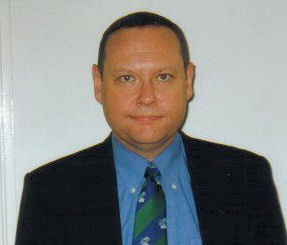Alex Standish (UK academic)
Standish was until August 2006 the editor of Jane's Intelligence Digest. According to a biographical note on the University of Durham website:
- Alex Standish was based in the southern Balkans for a number of years and is a recognised specialist in the fields of blood feuds within the ethnic Albanian communities and human trafficking from and via the region. A graduate of Durham University, he previously worked for the BBC as a foreign correspondent in Albania, Kosovo, Serbia and Macedonia, as well as being a documentary producer with BBC Panorama. His current research focuses primarily on contemporary mutations of the blood feud concept and the development of strategies for feud resolution within ethnic Albanian communities, although he has also researched and produced two television documentaries for Channel 4 focusing on the payment of ‘blood money’ as an alternative to judicial execution in Saudi Arabia.
- His recent publications include Kosovo one year on: the crisis and its consequences (2001); The Kanun: Blood, Honour and Death within the Albania Communities (2005); Ethnography in Albania: a brief introduction (2006) and he is joint author of Albanian Identities: Myth and History (2002). He is currently preparing the first academic biography of Metropolitan Fan S. Noli, founder of the Albanian Orthodox Church, as well as writing a paper on the continuing practice of fraternization (ritual blood brotherhood) among ethnic Albanian males.
- Alex Standish is a Fellow of the Royal Anthropological Institute and Senior Research Fellow and Director of Development at St Chad’s College, Durham University. He is also Editor of Strategic Intelligence Review and he reviews for the Journal of the Royal Anthropological Institute.[1]
Contents
Views
According to Spiked Online in August 2002 Standish was sceptical of the link between Iraq and Al Qaeda:
- Alex Standish, editor of the UK journal Jane's Intelligence Digest - required reading for war-watchers and war-makers everywhere - thinks US intelligence officials are making 'a big mistake' on Iraq. 'They are trying to convince us of something that is highly unlikely', he says. 'If they really believe that Saddam is feeding and sustaining bin Laden's men, then they can't possibly understand the fundamental difference between Iraq and al-Qaeda.'[2]
In 2003 Standish criticised George Bush and urged more attention on surveillance and spying on muslims:
- Alex Standish, the outspoken editor of Jane's Intelligence Digest, described Mr Bush's statement as "very premature and over-simplistic".
- "One has to divorce Iraq from the war on terror as it was originally launched," he said. "The real war is against non-government operatives. There is evidence that al-Qaeda and remnants of the Taleban are still active. It is simplistic to say that there has been a turning point."
- Mr Standish said that the causes of Islamic militancy still existed and might even be strengthened by the war in Iraq. "The problem with these speeches is that politicians tend to tell the public what it wants to hear."
- And a new breed of activists had emerged, he said, as had become further evident with the alleged role of two young British Muslims in a suicide bombing in Tel Aviv.
- "There is a new kind of westernised young man, fluent in languages, able to travel on international documents and filled with ideological and religious fervour.
- "In Britain, the security services and police have been extremely slack in their monitoring of extremist groups. They do not have the language experts.
- "Some websites in Arabic are full of calls to kill Americans and Jews. But the police can't read them so they cannot be used to launch prosecutions for incitement.
- "The British Government is rightly reluctant to stereotype people, as happened with the Irish in the 1970s, but this means that there is a lack of information." [3]
In 2005 Standish was quoted on his view on the London bombings:
- If it turns out there was a single mastermind for both events and a common bombmaker, experience shows they probably would have fled Britain before the attacks, said Alex Standish, editor of Jane's Intelligence Digest. A likely hiding place would be in western Europe, where they could flee without having to undergo tough border security checks.
- "They'll go to ground in areas that they will not be conspicuous," Standish said. "Most European Union countries have a significant Muslim population where these guys can just sit there and fade into the background."[4]
Affiliations
Publications
- Standish, A. 2000. Kosovo one year on: the crisis and its consequences. London: Centre for Research into Post-Communist Economies. (Additional information)
- Standish, M.J.A. 2002. Enver Hoxha's role in the development of Socialist Albanian Myths. In Albanian Identities: Myth and History. Schwandner-Sievers, S. & Fischer, B.J. London: Hurst. 115-124. (Additional information)
- Standish, A. 2005. The Kanun: blood, honour and death within Albanian communities. Foundation II(1): 74-93. (Additional information)
- Standish, A. 2006. Ethnography in Albania: a brief introduction. Durham: Durham University Library.[5]
Notes
- ↑ University of Durham Staff Profiles Mr Alex Standish, FRI, FRAI, accessed 14 February 2008
- ↑ Brendan O'Neill link between Saddam and bin Laden? No way' The editor of Britain's top military journal picks some holes in the US case for war. 28 August 2002, accessed 14 February 2008
- ↑ Paul Reynolds BBC News Online world affairs correspondent War on terror: Has the tide turned? Last Updated: Friday, 2 May, 2003, 15:07 GMT 16:07 UK
- ↑ LONDON (AP) — London bombs underscore global reach of terrorism USA Today, Posted 7/30/2005 3:40 PM Updated 7/31/2005 5:54 AM, accessed 14 February 2008
- ↑ University of Durham Staff Profiles Mr Alex Standish, FRI, FRAI, accessed 14 February 2008
